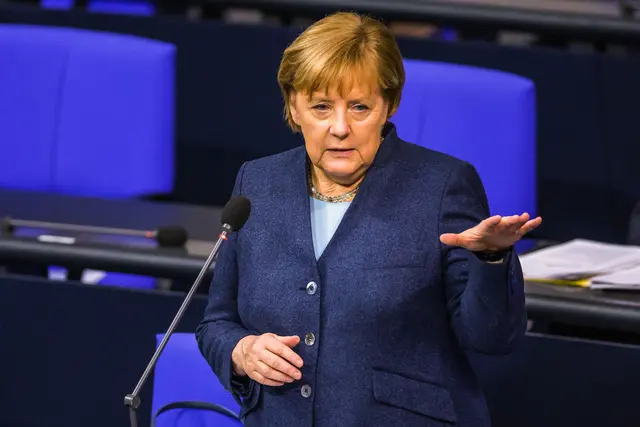Chancellor Angela Merkel proposed keeping German lockdown restrictions in force for another four weeks after Covid-19 cases rose beyond a level that may prompt government action to avoid health-care overload.
The plan would extend and slightly tighten existing curbs through April 18, according to a chancellery draft seen by Bloomberg. Merkel and regional government leaders will discuss the proposals on Monday during talks on how to proceed with the lockdown amid an upward curve of infections in Europe’s biggest economy.
With much of Europe headed for its Easter holiday break at the end of March, the draft suggests mandatory quarantines and Covid tests for travelers returning to Germany, while indicating that officials haven’t agreed on that measure yet.
For hard-hit areas in Germany, other possible curbs where a final decision is pending include nightly curfews until 5 a.m. and closures of schools and child care if teachers and pupils can’t get tested twice a week.
Cases in Germany are rising again after authorities began to relax restrictions in late February and set out a plan to gradually unwind the remaining curbs -- including the partial closure of non-essential stores and the shutdown of hotels, restaurants and gyms, as well as cultural venues. That plan depends on the infection trend, heightening the stakes for today’s talks after the number of cases jumped in the past few days.
The national seven-day rate of infections per 100,000 people rose to 107.3, the Robert Koch Institute health agency reported Monday, the highest since Jan. 26. Johns Hopkins University data showed German cases increased by 768 in the 24 hours to Monday.
The resurgent pandemic has prompted some health experts to warn that hospitals’ intensive care units risked being overwhelmed within a few weeks if the exponential growth in cases continues. On Sunday, the number of Covid-19 patients in intensive care rose to 3,056, the highest in almost a month.
“We expect a drastic increase in the number of patients in the next few weeks,” said Gernot Marx, president of the German organization for intensive and emergency care.
Germany uses the incidence rate as a gauge of Covid-19’s spread. If it exceeds 100 for three days in a row in a certain region, an “emergency brake” provision allows authorities to tighten lockdown measures again. That threshold had been crossed in ten out of 16 federal states as of Monday, prompting some regional leaders to call for uniform nationwide measures for virus hotspots.
“We have an instrument that works: the emergency brake. It must be applied consistently everywhere in Germany,” Bavarian Prime Minister Markus Soeder told the Frankfurter Allgemeine Sonntagszeitung in an interview. “Otherwise it will become a toothless tiger.”
Regional leaders and members of Merkel’s cabinet disagree on what to allow for the upcoming Easter holidays. The prime ministers of Mecklenburg-Western Pomerania, Schleswig-Holstein and Lower-Saxony want to allow their citizens to go on holiday within the confines of their own states, while Germany’s Vice-Chancellor Olaf Scholz warned against a “big wave of travel” that will jeopardize the summer holidays in an interview with Bild am Sonntag.
“Many people are really corona weary, and we have to take that into account in our decisions,” Stephan Weil, premier of Lower Saxony, said in an interview with ZDF television on Monday.
Merkel’s Christian Democratic Union suffered a rout in two regional elections this month. The stuttering pace of the vaccine rollout, irritation with lockdown restrictions in place since late last year and a widening scandal over claims that some conservative lawmakers profited from the pandemic have all taken a toll on her popularity.
Even so, the chancellor prepared the public for unpopular decisions at Monday’s meeting.
“We are seeing exponential growth” in cases, she said Friday. “We will unfortunately have to make use of the emergency brake.”
(BLOOMBERG)
 简体中文
简体中文

